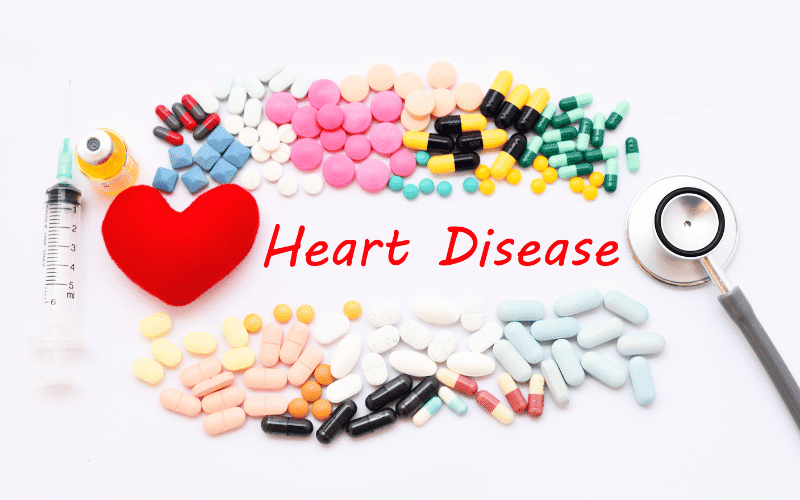FAQs on Early Signs of Heart Disease

1. Is it possible to have heart disease without any symptoms?
Yes, it’s possible to have heart disease without noticing any symptoms, especially in the early stages. This is why heart disease is often termed a ‘silent killer.’
It’s also worth noting that the symptoms can vary greatly from person to person, and some people might not experience the typical symptoms like chest pain. Regular check-ups and screenings are vital, especially if you have risk factors for heart disease.
2. Do symptoms of heart disease differ between men and women?
Men and women can experience the same symptoms of heart disease, but there are often differences in how they perceive them. For instance, chest pain is a common symptom in men, while women may experience symptoms like nausea, shortness of breath, and extreme fatigue more often. This doesn’t mean women don’t experience chest pain, but they might describe their pain differently than men.
3. Can young people show early signs of heart disease?
While heart disease is more common in older adults, it can affect people of all ages. Poor lifestyle choices, like an unhealthy diet, lack of exercise, smoking, and excessive alcohol use, can lead to early signs of heart disease in younger people. Moreover, genetic factors can play a significant role, and some people might be predisposed to heart disease due to their family history.
4. Is it normal to experience chest pain during exertion?
While it’s common to feel your heart rate increase during physical exertion, chest pain or discomfort is not normal and should always be taken seriously. It could be a sign of angina, which indicates that your heart is not getting enough oxygen-rich blood. If you experience chest pain, especially if it’s accompanied by other symptoms like shortness of breath or nausea, seek medical help immediately.
5. Can symptoms like snoring be an early sign of heart disease?
Snoring can be an early sign of sleep apnea, a condition that causes repeated stops and starts in your breathing while you sleep. Over time, untreated sleep apnea can lead to various heart problems, including heart disease. If you have been told you snore loudly or make choking noises in your sleep, it may be worthwhile to discuss this with your healthcare provider.
6. How soon should I seek help if I notice potential early signs of heart disease?
If you experience potential symptoms of heart disease, particularly if they are new, worsen, or occur at rest, you should seek medical attention immediately. Remember, early detection and management of heart disease can significantly reduce the risk of severe complications, including heart attack and stroke.
7. Can the symptoms of heart disease be temporary?
Yes, some symptoms of heart disease can come and go, like angina (chest pain), which often arises during physical exertion or emotional stress and subsides with rest. However, any recurring chest pain or discomfort should always be evaluated by a healthcare professional.
8. Can persistent coughing or wheezing be a sign of heart disease?
Yes, a persistent cough that produces white or pink mucus or persistent wheezing can be a symptom of heart disease. When the heart cannot pump blood effectively, fluid can build up in the lungs, leading to these symptoms.
Conclusion: Staying Attentive to the Early Signs of Heart Disease
Heart disease is a prevalent condition that can present in numerous ways. Understanding and recognizing the early signs of heart disease are crucial for early diagnosis and treatment.
The 15 signs discussed in this article – chest discomfort, shortness of breath, digestive problems, lightheadedness, dizziness or fainting, leg pain while walking, foot or ankle swelling, irregular heartbeat, jaw or neck pain, upper body discomfort, persistent or unusual fatigue, frequent urination, rapid weight gain, snoring or sleep apnea, and persistent wheezing or cough – may appear independently or in combination.
Each of these symptoms can provide valuable clues about the condition of your heart. However, it’s essential to remember that many of these signs can also relate to other medical conditions. Therefore, the presence of one or more of these symptoms should prompt a visit to a healthcare professional for a thorough evaluation rather than a self-diagnosis of heart disease.
Furthermore, heart disease can often develop silently, highlighting the importance of regular health check-ups, particularly if you have risk factors such as hypertension, high cholesterol, diabetes, family history of heart disease, smoking, and obesity.
Early detection and intervention of heart disease can significantly improve long-term outcomes and decrease the risk of severe complications such as heart attack or stroke. Hence, it is vital to stay attentive to your body’s signals, listen to these signs, and seek timely medical attention.
Remember, when it comes to heart health, every beat matters. Stay aware, stay informed, and most importantly, stay heart-healthy.